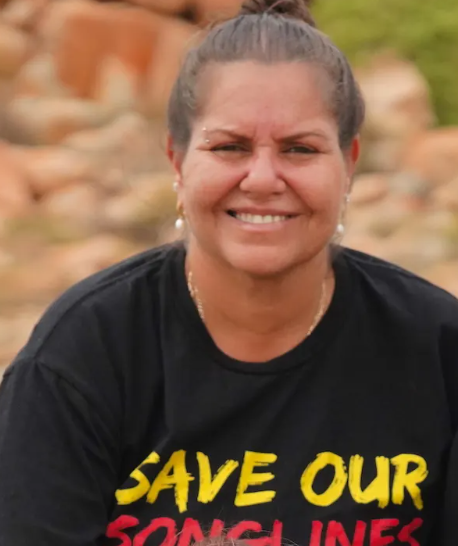Murujuga traditional custodian, Mardudhunera woman and recent Federal Court victor, Raelene Cooper, has responded to comments made by Opposition leader, Peter Dutton, and WA Premier, Roger Cook, and the news this week of a major incident affecting the Scarborough gas pipeline off the coast of Murujuga.

According to a report in WA Today, Federal Opposition Leader, Peter Dutton, has vowed to defund the Environmental Defenders Office (EDO) if the Coalition wins the next election.
“The Environmental Defenders Office is a body which has been funded by the Albanese government to try and attack mining companies, and to try and stymie new developments, and to try and revisit approvals that have already been given,” Dutton said.
Roger Cook described Dutton’s statement as knee-jerk politics, according to the WA Today report: “Well, the funding that goes into the whole environmental protection regime is about continuing to make sure that voices are heard in that debate,” Cook said. “I think to simply move to the idea that you can defund the EDO is a knee-jerk, political retail sort of response to the situation.
“We know that the people of Western Australia and Australia want to protect our environment and see the responsible development of our resources, making sure all voices are heard, and that [court] process is an important part of that.”
Murujuga traditional custodian, Mardudhunera woman and recent Federal Court victor, Raelene Cooper, said: “Our opponents are trying to take away the only safety net that we have. Mr Dutton has not justified any of his comments.
“The federal government has already tried to break us down with the Voice referendum. The WA government has then ripped the heart out of our Aboriginal Heritage Act.
“And now they are all repeatedly hammering the only safety net that we have left. The legislative protections, the NOPSEMA regulations, the legal defences we mount – this is just information sharing and it must be preserved and protected, because it is also how we share our stories with the world.
“I am really scared. I am really scared for the animals, for our environment and for our sacred songlines. This is the unknown. When incidents happen, like the Scarborough pipeline disaster yesterday, it is traumatic, it is tragic and it is terrifying.
“Man, industry, governments, decision makers are making terrible decisions to allow these companies and these projects to go ahead without knowing the unknowns.
“If that incident has occurred today, what happens when a fully pressurised gas pipeline breaks in our precious ocean? Humans, animals – where do we fit into this chaos that is being unleashed? How is it that these companies and these governments allow this poisonous, dangerous, destructive behaviour to continue?”
The Offshore Alliance union has claimed that Woodside was taking unacceptable risks on its offshore gas pipeline project, following a rupture in the pipeline earlier this week.
In September 2023, Ms Cooper was been granted an urgent injunction to prevent Woodside Energy conducting seismic blasting.
She filed the application on 7 September after Woodside warned it was ready to commence blasting, despite an unresolved legal challenge to the validity of its approval. Woodside subsequently agreed not to blast until the injunction application was heard by the Federal Court.
Justice Colvin decided that the injunction should be granted in part due to the reasonable prospect that the first ground of Ms Cooper’s substantive legal challenge to NOPSEMA approval of the seismic blasting will be successful.
The injunction prevented Woodside conducting seismic testing for the Scarborough Gas Project until the 28th of September.
Represented by the Environmental Defenders Office, Ms Cooper filed an application for judicial review in August on two grounds, the first arguing the offshore regulator NOPSEMA made a legal error in approving the blasting and the second that Woodside had not met a condition of the approval that she be properly consulted.
Ms Cooper was deeply concerned about the seismic activity’s impact on her Songlines and the species connected to them, including whales and turtles, which are of high cultural importance.
“Woodside have not conducted proper consultation with traditional custodians about the impacts of their seismic blasting on our culture,” Ms Cooper said at the time.
“The risks and the impacts of Woodside’s seismic blasting and the consequences of these actions will be life threatening for many species of water life, especially the whales. These majestic and graceful marine mammals carry our songlines from one part of Country to another, they are documented on our munda (rocks), and they are our dreaming stories that I hold.
“Our planet and our world is being attacked; we humans are being attacked; my ancient culture is being attacked; and I and those who carry and hold songlines are being attacked. If we don’t act, then we too face the same fate as those majestic animals who recently beached themselves in Albany to get out of the water.”
Woodside wants to conduct seismic blasting for its Scarborough Gas Project – a for-export LNG proposal off Murujuga/the Burrup Peninsula in Western Australia, which will result in the release of an estimated 878.02 million tonnes of carbon dioxide over its lifetime.
Despite finding that Woodside’s consultation with First Nations stakeholders, required by law, had been inadequate, NOPSEMA gave approval for the seismic blasting on July 31. Conditions were attached to the approval that further consultation needed to be carried out before commencement of the blasting.
Ms Cooper argued that NOPSEMA could not grant the approval until she had been properly consulted; and alternatively, that Woodside could not begin seismic testing until Woodside had consulted with her, as required under the conditions of Woodside’s approval from NOPSEMA.
Seismic testing involves blasting compressed air from a specially adapted ship. The noise from the blasts causes sound waves to bounce off the seabed back to sensors carried by the ship. It’s done to map fossil fuel reserves as a precursor to drilling.
The impact of seismic blasting on marine animals such as whales can include damage to the sensors that they use to hear, ability to communicate through their electro-frequencies, stress, displacement from habitat, physical injuries and death.
In 2022, EDO client Dennis Tipakalippa successfully challenged approvals granted by NOPSEMA to gas company Santos for drilling its Barossa Gas Project, north of the Tiwi Islands. During the hearing Mr Tipakalippa and other Tiwi Traditional Owners demonstrated their deep cultural connection to the Sea Country, including through On-Country evidence.
The court agreed with Mr Tipakalippa and the Munupi clan that they had not been properly consulted on the project as stakeholders, as required by law, and overturned the approval. The decision was upheld on appeal by the Full bench of the Federal Court in November.


